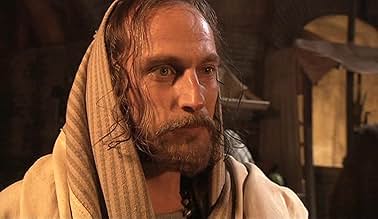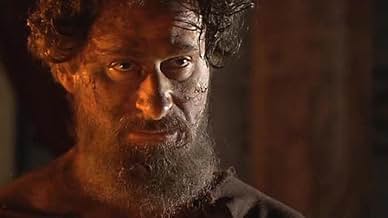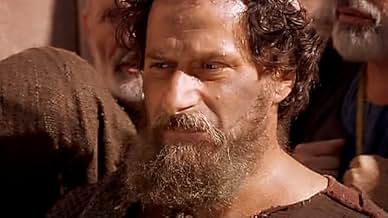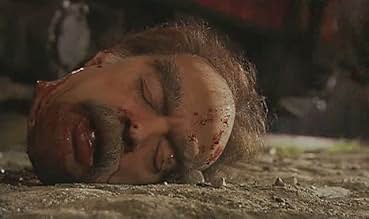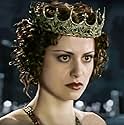PUNTUACIÓN EN IMDb
7,5/10
5,2 mil
TU PUNTUACIÓN
El diablo y sus ayudantes visitan Moscú en tiempos del régimen de Stalin. La ideología atea oficial se enfrenta a una serie de acontecimientos sobrenaturales.El diablo y sus ayudantes visitan Moscú en tiempos del régimen de Stalin. La ideología atea oficial se enfrenta a una serie de acontecimientos sobrenaturales.El diablo y sus ayudantes visitan Moscú en tiempos del régimen de Stalin. La ideología atea oficial se enfrenta a una serie de acontecimientos sobrenaturales.
- Premios
- 3 nominaciones en total
Explorar episodios
Reseñas destacadas
I watched this mini on a DVD so my perception wasn't as fragmented as it perhaps would have been if I watched one episode a day on TV. I read 'Master and Margarita' at least ten times so I know it pretty much by heart. It came as a relief that Bortko followed the original text so closely and didn't turn it in one of Hollywood 'junk' adaptations. There's no point in getting hysterical about the fact that this film is not as good as the book it could never be. I agree with other comments here that many dialogues are 'still born' because the text was transferred from the book too literally with no dramatic adaptation, particularly when Bulgakov's 'author's' commentaries were used in the dialogues. Abdulov and Basilashvili were the best. To my mind, Basilashvili, in particular, added to my previous perception of Woland and expanded this character if that's at all possible. The main complains are Begemot all of whose personifications failed miserably and Gaft's character who was completely out of context and rather weird. Gaft already played Beria in another movie and his appearance here looked like a piece cut out from that movie and pasted into this one. However this is all minor and generally I enjoyed the film. I was only really disappointed with Bortko's interpretation of the Ball. Having followed the book so maniacally to the last letter he suddenly deviated off track and not in a good way. In Bulgakov's book the Ball is an explosion of colour, light and music with walls of flowers and rainbow fountains. Whether it was a poor budget to blame or inability to use decent special effects but Bortko created some grey depressing place in the middle of nowhere which looked rather bizarre. Bulgakov featured Margarita flying through the ball halls in shoes made of rose petals and wearing nothing except heavy pendant over her neck whereas Bortko dressed her in torture chains and pinned her to the ground. It all looked a bit sado-masochistic and I doubt Bulgakov saw it that way. I'm surprised no one here commented on it. All in all I think it's not a bad attempt, certainly for a mini. I was expecting something much worse having seem some of the rubbish produced my Russian movie makers these days. To those who say it's awful, I think you should calm down and accept that Bulgakov's book and this movie are completely separate entities and the film can't be as deep because it can't reproduce all the philosophical richness of the literary work. It could try but then it won't appeal to a wider audience which prefers easily digestible adaptations.
"Master and Margareth" has always been my favorite book. I have read a lot of books, and none of them had captivated and haunted me in such a way that I would read it again and again and again. It is one of the most unusual and mysterious books ever written in the 20th century. And, finally, there is a movie which is as close to the original as possible. To be honest, there is a lot of really bad movies made in Russia, and most of them are so dreadful that it should be made illegal to pocess them! "Master and Margareth" is a pleasant and distinguished exemption from the endless flood of utterly horrible junk which is called Russian film-making. I really loved the movie. The actors are great, digital photography and the special effects aren't so bad either. Of course, it could have always been better but Russian films never have the same budget as an average Hollywood flick. I enjoyed the way the movie turns from B&W to color and opposite. And the soundtrack is amazing. They should release it separately on a CD.
This long awaited version does not mean that you don't need to read the book. No matter how perfect the adaptation is (it is far above excellent in this case), it can never replace the original. If you've never read it, do yourself a favor and do it as soon as possible. If you had read it before, it is really worth giving it another go. If you do it once every 5-10 years, you will definitely find something new in it.
Finally, it has been released with English subtitles. It would not be really fair to all English speaking scholars, researchers and Bulgakov's lovers who otherwise wouldn't have been able to watch this masterpiece.
This long awaited version does not mean that you don't need to read the book. No matter how perfect the adaptation is (it is far above excellent in this case), it can never replace the original. If you've never read it, do yourself a favor and do it as soon as possible. If you had read it before, it is really worth giving it another go. If you do it once every 5-10 years, you will definitely find something new in it.
Finally, it has been released with English subtitles. It would not be really fair to all English speaking scholars, researchers and Bulgakov's lovers who otherwise wouldn't have been able to watch this masterpiece.
This TV-series of 10 episodes, broadcast at the end of 2005 on the Russian Telekanal Rossiia, scored unprecedented ratings.
It was the second attempt of director Vladimir Bortko to film Bulgakov's masterpiece. In 2000 he had already been solicited by the Kino-Most film studio, associated with the competing channel NTV, but at the last moment the company did not succeed to come to an agreement with Sergei Shilovsky, grandson of Bulgakov's third wife, and owner of the copyrights. This time, with Rossiia, it worked. And it did not pass unnoticed.
This TV-epopee of more than 8 hours was heavily criticized, or at least regarded with much skepticism, before it was shown on screen. Sometimes it was sincere and well-grounded concern about the authenticity, but sometimes it seemed as if the Bulgakov die-hards behaved like modern Latunsky's by reproaching a movie they hadn't seen yet with sacrilege. Or maybe it was because of the gigantic publicity campaign that was launched to promote the series, and that could give reasons to fear an ambitious, but superficial Hollywood-ish production. But fortunately it wasn't the case.
In contrast with the earlier screen adaptation of Aleksandar Petrovic in 1972, director Vladimire Bortko (° Moscow, 1946) followed the book meticulously. If you have 10 times 52 minutes available for it, it is of course, easier than when you're supposed to deliver a 90 minutes movie picture. The setting of a TV-series appeared to be an ideal format to elaborate the complicated, multidimensional work with many different characters. Bortko had already shown his talent with his TV-adaptation of Fyodor Dostoevsky's The Idiot in 2003. Besides, he already filmed another novel of Bulgakov before: "Heart of a Dog", in 1988. He followed the dialogues almost word for word because, so he said, Bulgakov wrote the novel almost like a screenplay.
Ik was skeptical too when I saw the DVD at дом книги (Dom Knigi or "House of Books") in Moscow. But curiosity was stronger than skepticism and, frankly speaking, I was pleasantly surprised from the first images. Woland's meeting with Ivan and Berlioz, and the first confrontation of Pilate and Yeshua Ha-Notsri are not only beautifully portrayed and well performed, but in addition they matched remarkably well with the images that I had in mind when I first read the book.
The three layers of the novel are reflected more than well, with a well manipulated alternation of colour and black-and-white. The actors are casted accurately and they play the characters faithfully to the novel's intentions that even the most convinced skeptics shut their mouths, despite the huge success on December 29, 2005 more than 80 million people were watching.
Must I find demerits? Well... maybe the depiction of Behemoth then. With the existing technologies it could have been done better, but after all I can only conclude that, even though it is "only" TV, this series doesn't disenchant and its main merit is probably the the fact that Bulgakov now found a much bigger audience than he ever could have had with his books.
It was the second attempt of director Vladimir Bortko to film Bulgakov's masterpiece. In 2000 he had already been solicited by the Kino-Most film studio, associated with the competing channel NTV, but at the last moment the company did not succeed to come to an agreement with Sergei Shilovsky, grandson of Bulgakov's third wife, and owner of the copyrights. This time, with Rossiia, it worked. And it did not pass unnoticed.
This TV-epopee of more than 8 hours was heavily criticized, or at least regarded with much skepticism, before it was shown on screen. Sometimes it was sincere and well-grounded concern about the authenticity, but sometimes it seemed as if the Bulgakov die-hards behaved like modern Latunsky's by reproaching a movie they hadn't seen yet with sacrilege. Or maybe it was because of the gigantic publicity campaign that was launched to promote the series, and that could give reasons to fear an ambitious, but superficial Hollywood-ish production. But fortunately it wasn't the case.
In contrast with the earlier screen adaptation of Aleksandar Petrovic in 1972, director Vladimire Bortko (° Moscow, 1946) followed the book meticulously. If you have 10 times 52 minutes available for it, it is of course, easier than when you're supposed to deliver a 90 minutes movie picture. The setting of a TV-series appeared to be an ideal format to elaborate the complicated, multidimensional work with many different characters. Bortko had already shown his talent with his TV-adaptation of Fyodor Dostoevsky's The Idiot in 2003. Besides, he already filmed another novel of Bulgakov before: "Heart of a Dog", in 1988. He followed the dialogues almost word for word because, so he said, Bulgakov wrote the novel almost like a screenplay.
Ik was skeptical too when I saw the DVD at дом книги (Dom Knigi or "House of Books") in Moscow. But curiosity was stronger than skepticism and, frankly speaking, I was pleasantly surprised from the first images. Woland's meeting with Ivan and Berlioz, and the first confrontation of Pilate and Yeshua Ha-Notsri are not only beautifully portrayed and well performed, but in addition they matched remarkably well with the images that I had in mind when I first read the book.
The three layers of the novel are reflected more than well, with a well manipulated alternation of colour and black-and-white. The actors are casted accurately and they play the characters faithfully to the novel's intentions that even the most convinced skeptics shut their mouths, despite the huge success on December 29, 2005 more than 80 million people were watching.
Must I find demerits? Well... maybe the depiction of Behemoth then. With the existing technologies it could have been done better, but after all I can only conclude that, even though it is "only" TV, this series doesn't disenchant and its main merit is probably the the fact that Bulgakov now found a much bigger audience than he ever could have had with his books.
OK i read this book and was curious to see the movie to see what they would.
I had seen many Russian series before this and was generally unimpressed as i think they spent all the money on the cars and not anything else.
Furthermore Goblin and a few other reviewers and critics i read were generally so so on it.
So i was incredibly surprised to find how well they pulled this off. Its not an issue of "accuracy" (even though an acquaintances mother who is a teacher of literature in Russia and read this 20 times cover to cover was very satisfied) it is an issue of originality. The black and white to color switches, the acting, the actors, the music i found it really well done as well it should be since it is so well loved in Russia.
Really they put in the effort and i was generally pleased with the result. Again not due to "accuracy" or inaccuracy, as that is impossible to do with certain films but with the originality and what i thought was quality film making.
Btw, when Kot Begemot turned into the guy who plays Stira in ShtrafBat, my jaw dropped seeing as that was the person with the "cat eyes" who i pictured when i read Master and Bulgakov described him.
10 stars is an understatement.
I had seen many Russian series before this and was generally unimpressed as i think they spent all the money on the cars and not anything else.
Furthermore Goblin and a few other reviewers and critics i read were generally so so on it.
So i was incredibly surprised to find how well they pulled this off. Its not an issue of "accuracy" (even though an acquaintances mother who is a teacher of literature in Russia and read this 20 times cover to cover was very satisfied) it is an issue of originality. The black and white to color switches, the acting, the actors, the music i found it really well done as well it should be since it is so well loved in Russia.
Really they put in the effort and i was generally pleased with the result. Again not due to "accuracy" or inaccuracy, as that is impossible to do with certain films but with the originality and what i thought was quality film making.
Btw, when Kot Begemot turned into the guy who plays Stira in ShtrafBat, my jaw dropped seeing as that was the person with the "cat eyes" who i pictured when i read Master and Bulgakov described him.
10 stars is an understatement.
I can't add much to the other reviews already posted here. As someone who loves Bulgakov's novel (in English translation), I was impressed and moved by this very faithful adaption to the screen. I am not sure if someone who had not read the book first would fully appreciate the work and would strongly recommend doing so before seeing the film.
There are a few minor changes from the book, some omissions and a few additions, but nothing that really changes it. The portrait of Jesus (Yeshua Ha-Notzri) and his execution are deeply moving. The major characters of Satan (Woland), the Master, Margarita and Pontius Pilate are wonderfully acted. So also are the minor characters, too numerous to list here.
One thing did puzzle me, the poor quality of the English sub-titles. Again, knowing the book minimizes the problem, but still in 2005, couldn't they have found a better translator, or used the dialog from one of the fine translations of the book?
I must give my thanks to all the people involved in this production who have given new life to Bulgakov's masterpiece.
There are a few minor changes from the book, some omissions and a few additions, but nothing that really changes it. The portrait of Jesus (Yeshua Ha-Notzri) and his execution are deeply moving. The major characters of Satan (Woland), the Master, Margarita and Pontius Pilate are wonderfully acted. So also are the minor characters, too numerous to list here.
One thing did puzzle me, the poor quality of the English sub-titles. Again, knowing the book minimizes the problem, but still in 2005, couldn't they have found a better translator, or used the dialog from one of the fine translations of the book?
I must give my thanks to all the people involved in this production who have given new life to Bulgakov's masterpiece.
¿Sabías que...?
- CuriosidadesThe film contains 163 minutes of special computer generated effects.
- ConexionesFeatured in Legendy mirovogo kino: Kirill Lavrov
Selecciones populares
Inicia sesión para calificar y añadir a tu lista para recibir recomendaciones personalizadas
- How many seasons does Master i Margarita have?Con tecnología de Alexa
- Is there *any* way to get this with English-language subtitles?
Detalles
- Fecha de lanzamiento
- País de origen
- Sitio oficial
- Idioma
- Títulos en diferentes países
- The Master and Margarita
- Localizaciones del rodaje
- Empresas productoras
- Ver más compañías en los créditos en IMDbPro
- Duración50 minutos
- Color
- Mezcla de sonido
Contribuir a esta página
Sugerir un cambio o añadir el contenido que falta

Principal laguna de datos
What is the Canadian French language plot outline for El maestro y Margarita (2005)?
Responde
